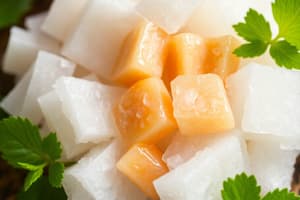Podcast
Questions and Answers
Which type of carbohydrate cannot be further hydrolyzed into smaller units?
Which type of carbohydrate cannot be further hydrolyzed into smaller units?
- Oligosaccharides
- Polysaccharides
- Disaccharides
- Monosaccharides (correct)
What is the main nutritional component found in seminal fluid?
What is the main nutritional component found in seminal fluid?
- Fructose (correct)
- Sucrose
- Glucose
- Ribose
What type of carbohydrate consists of 3-10 monosaccharide units?
What type of carbohydrate consists of 3-10 monosaccharide units?
- Polysaccharides
- Monosaccharides
- Disaccharides
- Oligosaccharides (correct)
Which of the following is true regarding hexoses?
Which of the following is true regarding hexoses?
Which sugar can be synthesized from glucose?
Which sugar can be synthesized from glucose?
What term is used to describe polysaccharides that contain only one type of monosaccharide unit?
What term is used to describe polysaccharides that contain only one type of monosaccharide unit?
Which monosaccharide is a key component of nucleic acids and nucleotides?
Which monosaccharide is a key component of nucleic acids and nucleotides?
What condition is characterized by high levels of glucose in the blood?
What condition is characterized by high levels of glucose in the blood?
What is the primary source of energy for spermatozoa?
What is the primary source of energy for spermatozoa?
Which of the following is NOT a role of glucose in the body?
Which of the following is NOT a role of glucose in the body?
Flashcards are hidden until you start studying
Study Notes
Definition of Carbohydrates
- Carbohydrates are polyhydroxy aldehydes or ketones or compounds that yield these on hydrolysis.
- They have a general molecular formula of $C_n(H_2O)_n$.
- Glucose, with a molecular formula of $C_6H_{12}O_6$, is an example.
Classification of Carbohydrates
- Monosaccharides are the simplest sugars, containing only one sugar unit.
- They cannot be further hydrolyzed into smaller units.
- Aldoses have aldehyde groups, ketoses have keto groups.
- They are classified by the number of carbon atoms: trioses (C3), tetroses (C4), pentoses (C5), hexoses (C6), heptose (C7), etc.
- Disaccharides are formed when two monosaccharides combine with the elimination of a water molecule.
- Oligosaccharides contain 3-10 monosaccharide units.
- Polysaccharides are formed when more than 10 sugar units combine.
Importance of Glucose
- Found in fruits, fruit juices, and is the principal sugar in the blood.
- High glucose levels in the blood (hyperglycemia) and in urine (glucosuria) indicate diabetes mellitus.
- It is a major source of energy for cells, especially neurons.
- Glucose can be used to synthesize other carbohydrates like glycogen, galactose, and ribose.
Importance of Fructose
- It is the main nutritional source of energy for spermatozoa and is found in the seminal fluid
- Found in fruits and fruit juices, as well as honey.
- Can be converted to glucose in the liver.
Pentoses
- Ribose is a key component of nucleic acids (RNA and DNA), and biologically important nucleotides like ATP, GTP, AMP, etc.
- Ribose also enters the structure of coenzymes NAD, NADP and FAD.
Hexoses
- D-Glucose
- D-Mannose
- D-Galactose
- D-Fructose
Importance of Galactose
- It can be converted into glucose in the liver.
- It is a component of lactose (milk sugar).
- It is used in the structure of glycoproteins.
Importance of Mannose
- It is a constituent of many glycoproteins.
Homopolysaccharides
- Polysaccharides containing only one type of monosaccharide unit.
Heteropolysaccharides
- Polysaccharides containing different types of monosaccharide units.
Derived Carbohydrates
- Formed from carbohydrates through chemical reactions.
Sugar Acids
- Formed by oxidizing sugars.
- Mild Oxidation (Hypobromous Acid, Br₂/H₂O) oxidizes the aldehyde group to a carboxyl group.
- Glucose → Gluconic acid
- Mannose → Mannonic acid
- Galactose → Galactonic acid
- Moderate Oxidation oxidizes the last carbon into a carboxyl group, producing uronic acids.
- Glucose → Glucuronic acid
- Mannose → Mannuronic acid
- Galactose → Galacturonic acid
- Strong Oxidation (Nitric Acid + Heat) oxidizes both the first and last carbons to dicarboxylic acids, known as saccharic acids.
- Glucose → Glucosaccharic acid
- Mannose → Mannaric acid
- Galactose → Mucic acid
- Mild Oxidation (Hypobromous Acid, Br₂/H₂O) oxidizes the aldehyde group to a carboxyl group.
Sugar Alcohols
- Formed by reducing the carbonyl group of a sugar.
- Glucose is reduced to sorbitol, mannose and galactose form sorbitol and mannitol, respectively.
- Sorbitol, mannitol, and dulcitol can be used to reduce intracellular levels of sorbitol.
- Their accumulation can lead to abnormalities like cataracts and riboflavin (vitamin B2) deficiencies.
Glycosides
- Formed when a hydroxyl group on the anomeric carbon of a monosaccharide (carbon 1) combines with another compound via a glycosidic bond.
- Can be formed with another monosaccharide (e.g., lactose and sucrose) or with a non-carbohydrate compound (aglycone) (e.g., sugar nucleotides like purines and pyrimidines).
Studying That Suits You
Use AI to generate personalized quizzes and flashcards to suit your learning preferences.



